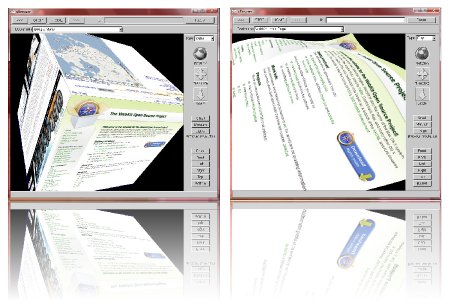WebKit Meta: A new standard for in-game web content
Over the last few months, our browser team at Nuanti Ltd. has been developing Meta, a brand new WebKit port suited to embedding in OpenGL and 3D applications. The work is being driven by Linden Lab, who are eagerly investigating WebKit for use in Second Life.
While producing Meta we’ve paid great attention to resolving the technical and practical limitations encountered with other web content engines.

uBrowser running with the WebKit Meta engine
High performance, low resource usage
 Meta is built around WebKit, the same engine used in web browsers like Safari and Epiphany, and features some of the fastest content rendering around as well as nippy JavaScript execution with the state of the art SquirrelFish VM. The JavaScript SDK is available independently of the web renderer for sandboxed client-side game scripting and automation.
Meta is built around WebKit, the same engine used in web browsers like Safari and Epiphany, and features some of the fastest content rendering around as well as nippy JavaScript execution with the state of the art SquirrelFish VM. The JavaScript SDK is available independently of the web renderer for sandboxed client-side game scripting and automation.
It’s also highly scalable. Some applications may need only a single browser context but virtual worlds often need to support hundreds of web views or more, each with active content. To optimize for this use case, we’ve cut down resource usage to an absolute minimum and tuned performance across the board.
Stable, easy to use cross-platform SDK
Meta features a single, rock-solid API that works identically on all supported platforms including Windows, OS X and Linux. The SDK is tailored specifically to embedding and allows tight integration (shared main loop or operation in a separate rendering thread, for example) and hooks to permit seamless visual integration and extension. There is no global setup or initialization and the number of views can be adjusted dynamically to meet resource constraints.
Minimal dependencies
Meta doesn’t need to use a conventional UI toolkit and doesn’t need any access to the underlying windowing system or the user’s filesystem to do its job, so we’ve done away with these concepts almost entirely. It adds only a few megabytes to the overall redistributable application’s installed footprint and won’t interfere with any pre-installed web browsers on the user’s machine.
Nuanti will be offering commercial and community support and is anticipating involvement from the gaming industry and homebrew programmers.
In the mid term, we aim to submit components of Meta to the WebKit Open Source project, where our developers are already actively involved in maintaining various subsystems.
Find out more
Today we’re launching meta.nuanti.com and two mailing lists to get developers talking. We’re looking to make this site a focal point for embedders, choc-full of technical details, code samples and other resources.

Does it support flash ?
nice 😀
Looks good!
Is is possible to compile it without X or KDE,… on a Linux server ? If so it will be perfect framework for khtml2png.
[…] a prestare attenzione alle novità che riguardano WebKit. Oggi ho letto un articolo su Meta, un porting di WebKit pensato per essere integrato nei videogame. Ne avevo parlato qualche […]
This is absolutely amazing. You guys have no idea how excited I am about this. 🙂
Excellent news! I’m excited to finally see a viable OSS alternative to embedding Gecko. Great work and good luck!
It’s stuff like this that makes me wonder why I even bother, when it’s so obvious that folks like Alp are way ahead of the curve. Bravo!
[…] equipo de Nuanti anuncia esta semana el desarrollo de Meta, un navegador basado en Webkit – la base de Safari – para […]
@adam:
…doh, Gecko __IS__ open source…!
Goodby Firefox!
Thank you!
Hey this is cool stuff 🙂